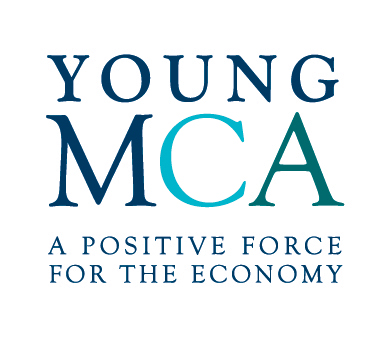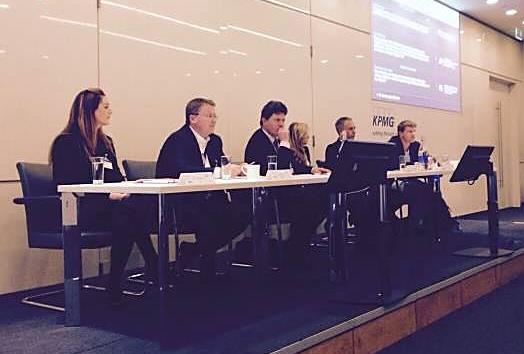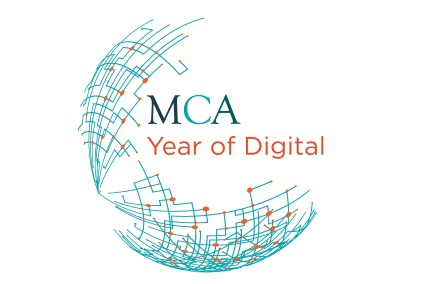Panel (L-R): Leah Williamson, EY; Tom Roberts KPMG; Paul Connolly, MCA (chair); Agata Cooper, Accenture; Rob Price, Atos; Johan, Hogsander, Transform
As often in the MCA’s Year of Digital, the question ‘What is Digital?’ posed at the recent Young MCA panel event hosted by KPMG, sparked a lively discussion.
Definitions from panellists included:
- “Digital is about technology change, organisational change but also social and cultural change.”
- “It’s about the magic in data and technology”
- “It is not about just ‘digitising’ the problems of the past, but rather identifying opportunities for efficiencies.”
- “It is about breaking barriers to entry.”
- “It is about serving the customer anytime, anywhere.”
Panellists illustrated the scale of the change by referring to the experience of a commuter, able to access news, mobile phone calls, their workplace, books, music, film and TV – all on the same handheld device. Products and services previously delivered through separate systems are now underpinned by common binary coding, collapsing boundaries between industries and creating new expectations among consumers about access and convenience.
1. How is digital changing clients’ needs?
The panel agreed that Digital has shaken-up the traditional roles in our clients’ companies. CIOs are becoming CDOs and moving onto companies’ executive teams. But panellists agreed that this was only meaningful change if it led to cross-company ownership of Digital. The CIO taking the agenda with them by changing their name would not be enough. In properly Digital enterprises, Digital is about everyone.
As more businesses perceive the strategic opportunity of Digital, Digital Consulting has hugely in recent times. MCA members are advising consultants on the full range of Digital “disruptors”. Indeed, when a member of the audience enquired whether we should leave digital to the specialist agencies, our panellist argued that the necessity for this cohesive approach means that a consultancy’s ability to take a birds-eye view could offer a more holistic, and ultimately better solution.
In addition, many clients are now asking consultants to “help them go Digital” as though this means the same thing for all of them. Digital is a “known unknown” for our clients. Consultants are working to define what this means for particular client circumstances, and to help them undertake their individual journeys.
2. How is Digital changing the assumptions of consulting and how it is done?
The pace of Digital is changing how consulting is done. Strategy is changing. Companies need to answer problems quickly, to mobilise short-term Digital answers to short-term problems, and adapt with agility. Programme management now depends on real time information and data rather than a series of plans mapped out in a Gantt chart. Benchmarking, once a staple of consulting, may be less relevant in the Digital Age, where every firm’s Digital answer will be different.
These factors are not just changing how consulting is done. They are challenging traditional assumptions around roles, responsibilities and hierarchies in consulting firms. There are huge opportunities for Digital natives to help reinvent consulting.
3. What changes is Digital making to the skills needs of consulting and what do young consultants need to do to get the most out of the Digital opportunity?
One panellist suggested that the need for literacy in the workplace was giving way to the need for electracy: fluency in the creative and communication potential of a range of technologies. Consultants of the future would need to:
- Be adaptable to new technologies in the ever-connected, ever changing digital world.
- Have depth and breadth , essentially T-shaped, knowledgeable across the entire Digital spectrum, but with domain specialisms
- Be curious consumers of Digital. Consultants must keep up to date and use their own experience to inform, engage and understand our clients.
This provides great opportunities for young consultants. Panellists said that in recruitment they were now looking for people who could think differently and were not necessarily traditional consultants. They want the ‘innovative creative’: someone Digitally informed and able to apply their expertise to challenge traditional assumptions and reinvent products and services. Panellists agreed that this might start to reverse the dynamics in the workplace, with new recruits able to teach more seasoned consultants some new tricks. Panellists and the audience felt that Digital was making consulting more exciting and a more attractive profession. And there was great optimism about the potential of Digital to realise new possibilities. As one panellist put it, “There is enough technology out there to make it possible. So let’s think about how we make it awesome’.
 Written by Sarah Murray, IT Advisory – Digital Consultant at EY and Young MCA Member.
Written by Sarah Murray, IT Advisory – Digital Consultant at EY and Young MCA Member.
This article was written for the Young MCA Update as part of the MCA Year of Digital.


